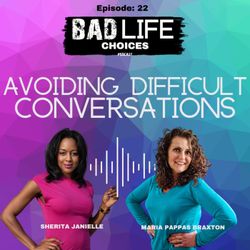Share

Bad Life Choices Podcast
Sleeping With Your Ex
In this episode, we delve into the complex and often emotionally charged topic of sleeping with an ex. We explore the myriad of reasons why people may find themselves in this situation, ranging from lingering feelings and seeking closure to familiarity and safety. We discuss the pros and cons of engaging in such encounters, weighing the potential benefits of there being less pressure and testing the waters of reconciliation against the risks of emotional attachment and hindering the ability to move on.
To navigate this delicate territory, we offer practical advice on how to approach sex with an ex in a healthy manner or when it's time to move on.
In addition, we're joined by a guest, Mackensie, who shares her personal experience of revisiting intimacy with a former partner. Her story provides valuable insights into the complexities and emotions involved with post-breakup sex. Through her narrative, listeners gain a deeper understanding of the intricacies surrounding this topic and the importance of self-awareness and emotional well-being in such situations.
More episodes
View all episodes

29. Not Having Basic Life Skills
43:48||Season 3, Ep. 29In this episode, the hosts engage in a lively discussion about essential life skills that everyone should possess. Covering a wide range of topics, they share personal anecdotes and provide practical advice on everything from basic home maintenance, cooking, financial literacy, personal wellness, and self-defense. The episode aims to highlight the importance of acquiring these skills to save time, money, and ensure overall self-sufficiency. Tune in to hear tips, stories, and a call to action for listeners to evaluate and improve their own life skills inventory.01:47 Life Skills: Personal Experiences and Observations05:47 Driving and Car Maintenance10:46 Home Maintenance: Lawn and Garden Care14:07 Cooking Basics: From Salads to Stir Fry20:52 Household Chores: Laundry and Cleaning22:44 Party in the Bed23:05 Cleaning Habits and Tips25:15 Home Maintenance Skills31:48 Financial Literacy and Education38:18 Health and Wellness Essentials42:04 Self-Defense and Survival Skills44:05 Conclusion and Final Thoughts
28. Being a Serial Monogamist
34:05||Season 3, Ep. 28Are you familiar with the term "serial monogamist"? In this intriguing episode, we unpack the life of those who hop from one romantic relationship to another, barely spending any time single.What are the telltale signs of a serial monogamist? From struggling to stay single to getting bored easily in relationships, we explore the complex behaviors and emotions driving this pattern. Discover the possible reasons behind this relentless search for love, including fears of commitment, childhood trauma, low self-worth, and the habit of self-sabotage.But what happens when you date a serial monogamist? We delve into the potential pitfalls, from emotional neglect to unfulfilling and potentially toxic relationships. More importantly, we discuss the benefits of breaking this cycle, like learning to enjoy solitude, focusing on personal goals, and nurturing non-romantic relationships.Ready to break free? We share practical steps to identify and change these patterns, including setting boundaries, building self-esteem, and seeking professional help. Whether you're a serial monogamist or dating one, this episode offers valuable insights and strategies to find healthier, more fulfilling connections.Tune in now to transform your approach to relationships!
27. Taking Bad Vacations
44:52||Season 3, Ep. 27In this episode, we explore the myriad reasons people take vacations and how to ensure they have a great time. Vacations serve as a much-needed break from the daily grind, providing rest and relaxation. They also offer opportunities to engage in specific activities like hiking and boating, learn about different cultures, visit famous landmarks such as the Acropolis or the Eiffel Tower, and reconnect with family and friends.However, not all vacations go smoothly. Common pitfalls include improper pre-planning, overpacking or underpacking, losing important documents, theft, illness, bad weather, missing transportation, scams, visa issues, and traveling with incompatible companions.To avoid these issues and ensure a pleasant vacation, consider the following tips:Plan your trip well in advance, including booking tickets and accommodations early.Create a flexible itinerary that allows for spontaneous adventures.Pack appropriately for your activities and the weather, bringing a little extra just in case.Make photocopies of essential documents and store them separately from the originals. Leave valuables at home and share copies with a trusted person.Stay vigilant about your surroundings and belongings.Familiarize yourself with local emergency numbers and medical facilities. Carry insurance cards and understand your insurance policy's coverage for medical care abroad.Have backup plans for activities in case of bad weather.Know the procedures for missed flights or cruises.Seek recommendations for trusted establishments from hotels or online forums.Ensure you have the correct documentation for international travel and understand visa requirements.Verify accepted payment methods at your destination and consider early currency exchange.Choose your travel companions carefully to ensure compatibility.Ultimately, vacations are essential for well-being and should be enjoyable. A bit of planning goes a long way in ensuring a smooth experience. Embrace the unexpected and focus on making great memories. Check out these sites to help you avoid a bad vacation:https://www.getawaytoday.com/travel-blog/7-common-vacation-problems-and-how-to-avoid-themhttps://grrrltraveler.com/10-things-that-will-ruin-your-vacation/#google_vignette
26. Dating Someone Who Is Close Their Ex
42:41||Season 3, Ep. 26In this podcast episode, the hosts delve into the complex topic of dating someone who maintains a friendship with their ex-partner. They explore the various reasons why individuals choose to remain friends with their former romantic partners, citing considerations like not wanting to hurt feelings, practicality in shared social circles or work environments, and the security and trust established in the relationship. However, they caution against one common motive: keeping an ex around as a backup plan or due to unresolved romantic desires.The episode also examines the emotions that arise when one's partner maintains a friendship with an ex, such as anger, insecurity, and jealousy. Strategies for navigating these feelings are discussed, including open communication, self-reflection to understand underlying insecurities, and evaluating whether the discomfort stems from a place of love or fear.Contrary to common perceptions, the hosts highlight potential benefits of having a partner who is friends with their ex. It can signify emotional maturity, respectfulness in handling relationships, and a capacity to value friendship beyond romantic entanglements. Moreover, it could lead to a more understanding dynamic regarding each other's past relationships and even foster new friendships.The episode emphasizes the importance of early and honest communication with partners about their relationships with exes. Ultimately, if one finds that they cannot handle their partner's friendship with an ex, it may be best to reconsider pursuing the relationship altogether.
25. Executive Burnout
39:23||Season 3, Ep. 25In this episode, we delve into the phenomenon of executive burnout—a term used to describe the work-related stress experienced by corporate executives, industry leaders, and professionals in high-level positions with significant responsibility and pressure. Executive burnout is characterized by extended periods of severe stress, and recognizing its symptoms is crucial for maintaining both personal well-being and professional effectiveness. Our special guest, Rasheedia Aigoro, offers an executive's insight on burnout and shares practical tips for managing it.Some of the signs to look for if you think you may be suffering from executive burnout include feeling perpetually drained, loss of any enjoyment from work and difficulty focusing. You may become cynical or critical towards others or have difficulty managing anger. Executive burnout can also manifest itself physically in the form of headaches, chronic pain and gastrointestinal issues. You may also experience sleep difficulties or turn to drugs or alcohol as a coping mechanism.The importance of managing symptoms of burnout is paramount. Setting boundaries, prioritizing self-care, taking breaks and learning to delegate responsibilities are some methods that people can use to help cope with the effects of burnout. It is also recommended that executives seek support and mentorship to navigate times of high-stress. Recognizing the symptoms of executive burnout is the first step towards addressing this critical issue. By implementing a structured plan to manage stress and prioritize well-being, executives can sustain their performance and maintain a healthier work-life balance. Tune in to learn more about identifying burnout and practical strategies to combat it.
24. Lowering Your Standards
42:17||Season 3, Ep. 24In this podcast episode, we delve into the intricate world of dating standards and the complexities surrounding them. We explore questions such as whether individuals adhere strictly to their dating standards and if they're willing to adjust them for someone who piques their interest.We dissect the disparity between standards and superficial qualities, identifying how one forms the foundation of a meaningful connection while the other often serves as a superficial attraction. Furthermore, we look at the nuances between non-negotiables and standards, recognizing the crucial distinctions between core values and preferences.Through real-life anecdotes and insights with our guest, Sherita’s friend, Tee, we learn how to strike a balance between maintaining high standards and being open to unexpected connections.The podcast highlights the importance of upholding standards as a means of self-respect and boundary-setting, fostering healthy relationships. Yet, it acknowledges the potential pitfalls of rigidity, including perceived pickiness, limited options, and prolonged singlehood.In our concluding remarks, we emphasize the benefits of setting reasonable standards that reflect genuine compatibility while advocating for flexibility in certain areas. We encourage listeners to remain true to themselves while remaining open to the possibilities that lie beyond their predefined criteria, ultimately aiming for a balanced approach that maximizes the potential for lasting happiness in relationships.Tamina Zaheri is a dynamic tech professional, currently leading a thriving sales team at a rapidly growing tech unicorn. With a deep passion for personal development, she has dedicated years to researching and practicing self-growth and transformative modalities. Her mission is to guide individuals through pivotal life transitions, helping them unlock their full potential. For the past nine years, Tamina has called Austin, Texas, home. There, she has cultivated a vibrant community and regularly hosts enriching events designed to foster profound connections, both within oneself and with others.
22. Avoiding Difficult Conversations
41:03||Season 3, Ep. 22In this insightful episode, we tackle the often-daunting task of having difficult conversations, whether with loved ones, colleagues, or even strangers. We provide practical strategies and empathetic insights to empower listeners in navigating these challenging interactions.The episode begins by identifying the people we commonly avoid having difficult conversations with, ranging from family members and partners to coworkers and even strangers in everyday situations. Next, we delve into the reasons why difficult conversations may be hard for people, such as anxiety, fear of conflict, and a lack of effective communication models in childhood. Finally, practical tips are shared on how to prepare for difficult conversations, including using "I" statements, focusing on listening, and being open to disagreement.Through candid discussions and personal anecdotes, listeners discover that difficult conversations often yield valuable insights and opportunities for personal growth. Whether it's realizing inaccurate expectations, learning to cope with discomfort, or discovering that the conversation wasn't as daunting as anticipated, the episode encourages listeners to embrace these moments as catalysts for positive change.In the wrap-up, listeners are reminded of the transformative potential inherent in difficult conversations and encouraged to approach future interactions with openness, empathy, and a willingness to learn and grow. This episode serves as a beacon of guidance for anyone seeking to navigate the complexities of communication with courage and compassion.
21. One sided Friendships
36:50||Season 3, Ep. 21In this podcast, we delve into the signs, effects, and solutions surrounding one-sided friendships. Identifying such relationships is crucial, with indicators ranging from conversations solely revolving around their needs to a lack of empathy, consistency, and trust. The podcast explores the emotional toll of these dynamics, including feelings of rejection, isolation, and vulnerability.Listeners gain insights into repairing one-sided friendships through open communication, altering interaction styles, and taking a step back to evaluate reciprocity. The importance of expressing one's needs directly is emphasized, along with the acknowledgment that, despite efforts, some friendships may not be salvageable.The podcast concludes by addressing the challenging process of ending a one-sided friendship. Clear communication is key, as is refraining from initiating contact to break the cycle. Seeking support from trusted individuals and professional therapists is encouraged, providing listeners with practical guidance for navigating and healing from the complexities of one-sided friendships.